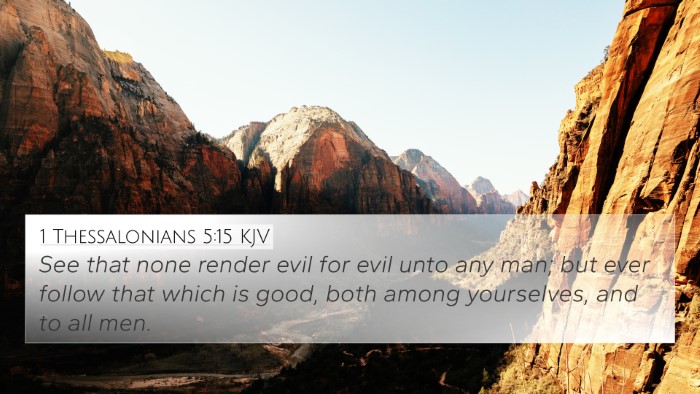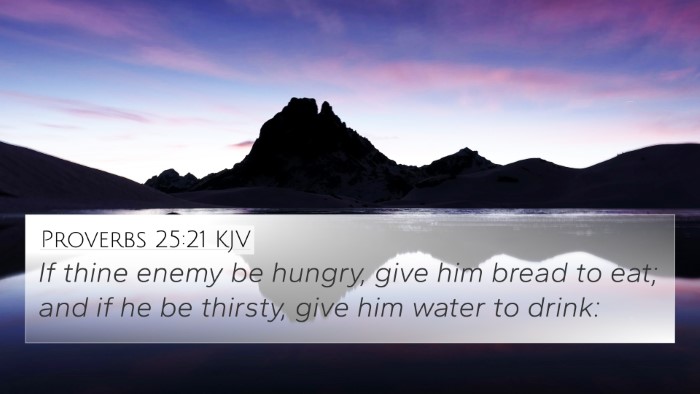Understanding Proverbs 24:29
Proverbs 24:29 states, "Do not say, 'I will do to him as he has done to me; I will pay him back for what he has done.'" This verse serves as a profound reminder about justice, retribution, and the moral high ground. Let's explore its meaning through insights from various public domain commentaries.
Summary of Insights
This proverb is a caution against the temptation for revenge. The writer, traditionally believed to be King Solomon, is advocating for restraint and forgiveness rather than seeking vengeance for perceived wrongs. Below are several insights from well-known commentaries:
- Matthew Henry: Henry emphasizes the importance of self-control and the futility of revengeful thoughts. He suggests that such attitudes can lead to a cycle of violence and further grievances. Instead, Christians are encouraged to leave vengeance to God.
- Albert Barnes: Barnes elaborates on the social consequences of repaying evil with evil. He argues that such actions undermine community and relationships. The verse serves as a moral compass guiding individuals to pursue reconciliation rather than conflict.
- Adam Clarke: Clarke focuses on the internal struggle that arises from feelings of revenge. He stresses that harboring these thoughts can lead to actions driven by anger, ultimately harming oneself more than the intended target.
Cross-References
Proverbs 24:29 connects with several other biblical texts, which highlight similar themes of justice, forgiveness, and the consequences of revenge:
- Romans 12:19: "Do not take revenge, my dear friends, but leave room for God’s wrath, for it is written: ‘It is mine to avenge; I will repay,’ says the Lord."
- Matthew 5:39: "But I tell you, do not resist an evil person. If anyone slaps you on the right cheek, turn to them the other cheek also."
- 1 Peter 3:9: "Do not repay evil with evil or insult with insult. On the contrary, repay evil with blessing, because to this you were called so that you may inherit a blessing."
- Luke 6:31: "Do to others as you would have them do to you."
- Galatians 6:7: "Do not be deceived: God cannot be mocked. A man reaps what he sows."
- Proverbs 20:22: "Do not say, 'I’ll pay you back for this wrong!' Wait for the Lord, and he will avenge you."
- Ephesians 4:32: "Be kind and compassionate to one another, forgiving each other, just as in Christ God forgave you."
Thematic Connections
This verse resonates with the broader biblical message concerning forgiveness and divine justice. It invites believers to reflect on their responses to wrongdoing, encouraging a Christ-like approach to interpersonal conflicts.
Comparative Bible Verse Analysis
When analyzing Proverbs 24:29 in conjunction with other verses, we can uncover a thematic tapestry woven throughout Scripture. This exploration reveals:
- Forgiveness vs. Retribution: Examining verses like Matthew 5:39 alongside Proverbs 24:29 illustrates Jesus' teaching on non-retaliation, drawing connections between the Old and New Testaments.
- The Cost of Revenge: By comparing Ecclesiastes 7:9, which states "Do not be quickly provoked in your spirit, for anger resides in the lap of fools," we see a consistent warning against the emotional toll of revenge.
- Trusting Divine Justice: Reflecting on Romans 12:19 in relation to Proverbs 24:29 emphasizes the theme of trusting God's timing and justice over seeking personal vengeance.
Tools for Bible Cross-Referencing
For individuals eager to explore these connections further, utilizing a Bible concordance or a Bible cross-reference guide can enhance understanding. Here are several recommended tools:
- Bible Concordance: A comprehensive list of biblical references that assists in locating related verses.
- Bible Cross-Reference Guide: A systematic approach to find and analyze interconnected scriptures.
- Cross-Reference Bible Study: Methods to deepen comprehension of biblical themes by studying related verses.
- Cross-Referencing Bible Study Methods: Techniques to engage with Scripture by examining parallels across different books.
User Intent and Biblical Application
For those asking, "What verses are related to Proverbs 24:29?" or "How do Proverbs 24:29 connect with other verses?", the listed passages and insights provide a starting point for personal reflection and study. Engaging with these texts allows for a deeper grasp of God's desire for justice tempered with mercy.
Conclusion
Proverbs 24:29 serves as a timeless admonition against the urge for retribution, encouraging us to embody the principles of forgiveness and patience. By exploring its connections through cross-references and thematic analysis, believers can cultivate a heart aligned with divine wisdom.









